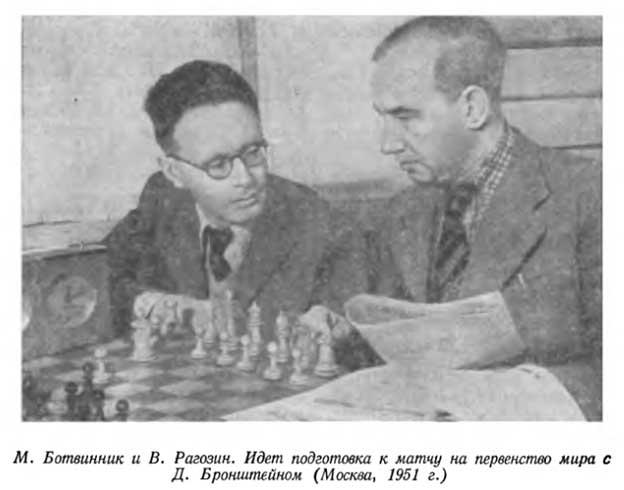
Botvinnik's Training Games
No other player was as famous as Botvinnik for his opening preparation until Kasparov came upon the scene. This reputation was in part the result of a life-style that never failed to make a deep impression on people. Botvinnik was known to be a very serious man with strict habits. During the 1946 Groningen tournament, he, together with his wife and child, was totally secluded from the outside world, spending all his time in his hotel room, where he would even take his meals.
He first alluded to the existence of these training games in his book about the 1941 Soviet Championship. This tournament was played in match format with six players playing each other four times. In the 20-round contest, often referred to as a match-tournament, Botvinnik won with a two-and one-half-point margin over his nearest rival, Keres. In the introduction to the tournament book, Botvinnik writes: A few words about my own play. I prepared for the tournament long and successfully...My old friend,master (now grandmaster) Ragozin, was of great help to me in mypreparations. I played training games with him under corresponding conditions. As I had grown unaccustomed to tobacco smoke and hadsuffered a little from it in other tournaments, during our games Ragozin often threw up real smoke screens. And so when my opponents in the tournament sent streams of tobacco smoke in my direction, (accidentally,of course!), it had no effect on me.
This exposition, with an ironic undertone toward the end, clearly shows that Botvinnik used these training games for various purposes. He mainly wanted to get ready for the battle; the openings and their theoretical aspects did not seem to be his primary aim. Still, the myth about the theoretical importance of the training games seemed to have its own life.
Gligoric in The World Chess Championship (1972) states: ''Only Botvinnik was capable for months, day after day, of playing exhausting private matches from which he gained no obvious advantage and of which the world would never know. Sometimes one of these games would be repeated in a real tournament as, for example, Botvinnik's famous victory over Spielmann in 1935 in only 11 moves or some of his victories in the match-tournament of 1948, when he became world champion. On these occasions Botvinniks opponents seemed tobe unarmed contestants against a champion armed to the teeth.Who was Botvinnik's sparring partner (or partners)? Not even his closest friends knew. It is supposed that at one time it was Ragozin,then Averbakh and now his official trainer Goldberg.''
